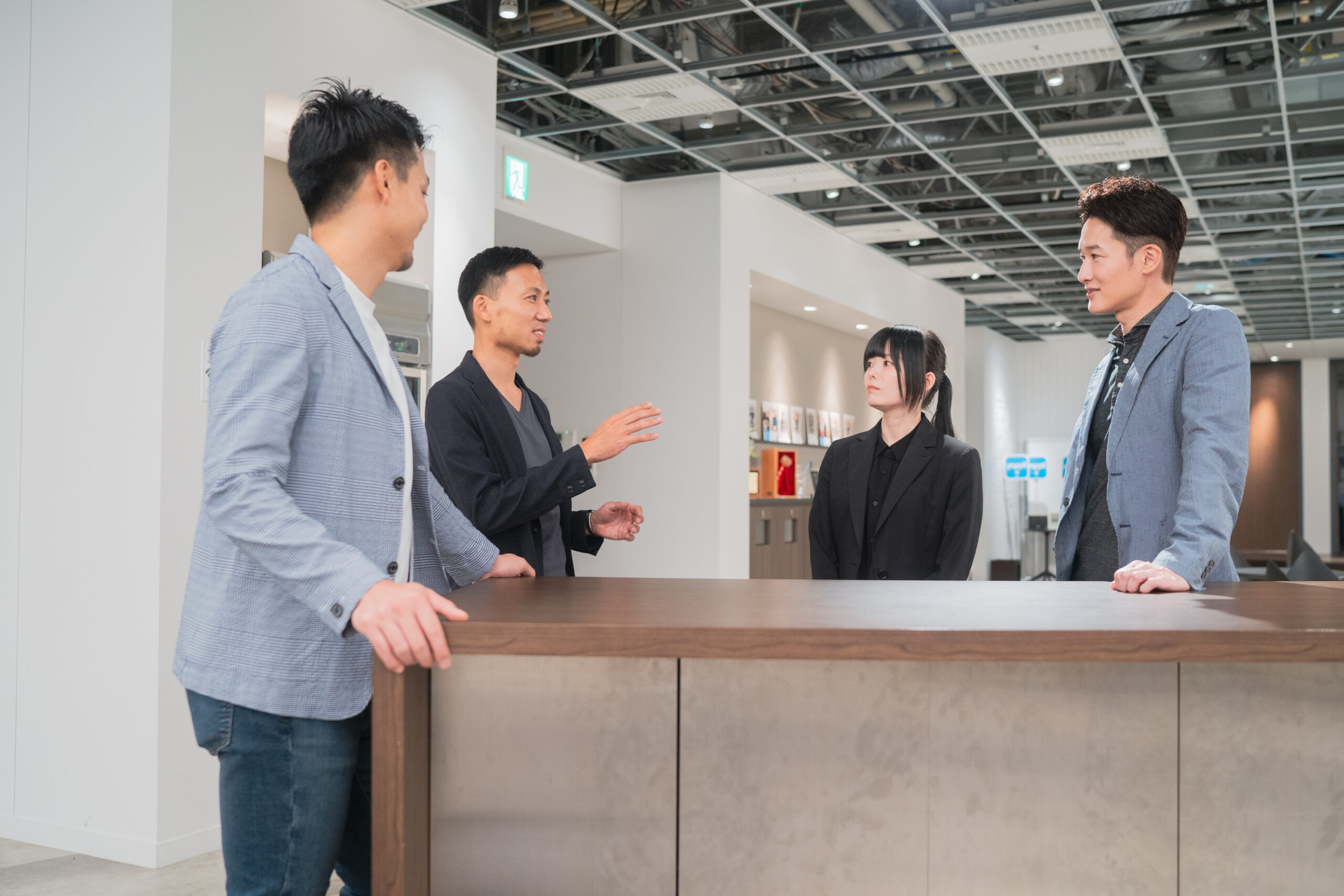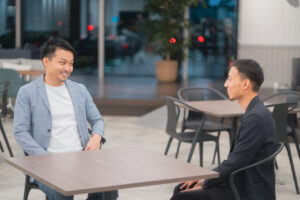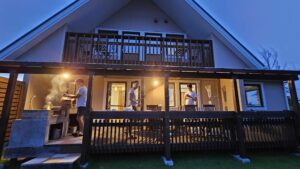

In 2019, HALF TIME launched its services, and this year marks its memorable 5th anniversary. In fact, prompted by the COVID-19 pandemic, the company has been practicing a “new way of working.” Employees sat down to talk about how their working style differs from conventional organizations.
◇
Yusuke Isoda (far right in photo): CEO of HALF TIME Inc. After building his career in the recruitment industry from his first job, he founded HALF TIME in 2017. Since 2019, he has been running recruitment and PR services specialized in the sports business field, also serving as head of the recruitment service division.
Domu Kumagai (far left): COO of HALF TIME Inc. After careers in the insurance and PR industries, he joined HALF TIME in 2019. He is mainly responsible for sales and business development, and also leads the PR and branding service division.
Yusuke Yamanaka (second from left): CCO (Chief Communications Officer) of HALF TIME Inc. After working at PR and branding agencies, he joined HALF TIME in 2019. He oversees the company’s own media and conferences as well as client services.
Nagisa Tajiri (second from right): Administration Department, HALF TIME Inc. After working at a startup, she joined HALF TIME in 2019. She manages back-office operations including accounting, finance, general affairs, and HR.
◇
Full Remote & Full Flex – HALF TIME’s “True Flexibility”

From left: COO Domu Kumagai, CCO Yusuke Yamanaka
Yamanaka: People often say HALF TIME is “unique,” because we have employees living overseas or outside the Tokyo metropolitan area. How did this become possible?
Tajiri: What comes to mind first is that we are “fully remote.” Like Kumagai-san living overseas, we can freely work from wherever we want—that’s quite unique, I think.
Isoda: The shift to full remote was triggered by the pandemic. Tajiri lives in Nagoya, Yamanaka in Kamakura, and Kumagai in Thailand (formerly in Vietnam). Everyone moved to different places, and around the same time, many started families. So I decided that full remote would be better for everyone.
As a manager, I care more about performance than about processes. As long as results are achieved, I don’t care about when or where people work.
Yamanaka: Recently, Tajiri-san has also been adjusting her working hours, right?
Tajiri: Yes, I sometimes work on weekends, which makes me “fully flexible.” Since my husband works weekends on shifts, it’s great that I can take weekdays off to align with him.
Kumagai: I used to live in Vietnam, and now I’m in Thailand. This way, I can balance family, personal life, and work. I always wanted to live abroad, and I also want to raise my child in diverse environments. So the company’s system matches perfectly with my family’s wishes.
Yamanaka: For me too, flexibility is crucial because of parenting. Being able to pause work during the day and resume at night helps a lot.
Balancing “Freedom” and “Responsibility”

Nagisa Tajiri, Administration Department, HALF TIME Inc.
Yamanaka: Hearing everyone’s stories, it feels like there’s more than just systems behind this “flexibility,” right?
Tajiri: I agree. I’ve wondered why full remote and full flex work so well here, and I think it’s because everyone naturally has a strong sense of responsibility. Without that, this environment would collapse.
Isoda: Some people can discipline themselves, and some can’t. This system can only function if the team consists of self-disciplined individuals. That’s why recruitment is crucial. I really focus on candidates’ independence when hiring.
Recently, I’ve also been thinking about how to motivate everyone to be even more proactive. One way is incentives. Now that the company is finally becoming profitable, we can provide financial incentives as well.
Kumagai: In a full-flex environment, results are of course important. But I feel that face-to-face time has also become more valuable. We hold company retreats once or twice a year, and those gatherings feel like “let’s get to know each other better” or “let’s open up more.” The value of meeting in person has increased precisely because we work remotely.
Care and Empathy Are Key – At Work and in Private Life

The company retreat, now an annual tradition. This summer, it was held in Chiba.
Yamanaka: Because we’re physically apart and not always working at the same time or on the same days, being considerate is really important.
Isoda: I truly want to value everyone’s families, and I want each member to also keep their colleagues’ families in mind while working. Of course, performance and results matter, but I believe these caring relationships themselves are very precious in life.
As students, you can easily set big goals with friends and work hard together. But as working adults, relationships tend to become businesslike and dry.
Recently, I’ve been thinking: Isn’t it wonderful if, even as professionals, we can trust and rely on each other, be mindful of one another’s families, and even be like friends? We’re still a small team now, but it might grow. Still, I want to build and preserve this kind of environment together.
